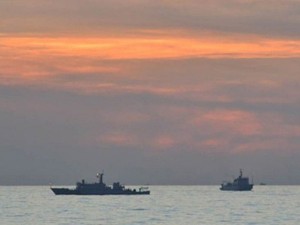Chinese fishing boats back in shoal – DFA

Chinese surveillance ships are seen off Scarborough Shoal in his undated file photo taken by the Philippine Navy and released by the Department of Foreign Affairs. AFP/DFA
MANILA, Philippines -The Department of Foreign Affairs on Tuesday confirmed that Chinese fishing boats have returned inside the lagoon of the disputed Scarborough Shoal.
”It has been confirmed by the Philippine Navy that, as of two days ago, there were no more ships inside the lagoon. The Chinese fishing boats have obviously returned,” Raul Hernandez, DFA spokesperson, said in a text message to reporters Tuesday.
The DFA said on Monday that all fishing vessels have left the lagoon in Scarborough Shoal as of Saturday.
On Tuesday, however, Navy Admiral Alexander Pama told reporters that as of Monday afternoon, there were about 28 Chinese fishing and government vessels in the disputed area, 23 of which were inside the shoal.
Pama said a Navy Islander aircraft was ordered to fly over the Panatag Shoal on Monday afternoon to check on the situation.
He said the Chinese fishing vessels and maritime ships come and go in the lagoon and the area in apparent rotation.
Pama said the DFA may have based its statement about the alleged pull-out of the Chinese fishing vessels out of the lagoon on “previous reports.”
In a statement Monday, Foreign Secretary Albert Del Rosario said: “Based on coordination between the Philippines and China, as of two days ago, we have received information that all (Chinese fishing boats) have left the lagoon of Bajo De Masinloc.”
When asked about the conflicting official statements, Defense Secretary Voltaire Gazmin replied: “We don’t want to react on that but what we are giving you are the factual operational report.”
He admitted the absence of Philippine ships in the Panatag Shoal weakens the country’s sovereignty.
“I’m sure there’s an impact. But the fact that our patrols are continuous, they may not be ships but we have planes and we see (the situation) and we get data, I think somehow that also helps,” he said.
China challenged the Philippines’ sovereignty over the Panatag Shoal since April 10 after two of its maritime ships prevented a Navy ship from arresting eight Chinese fishing vessels found to have poached endangered giant clams, live sharks and corals from the area.
After the Navy pulled out from the shoal a couple of days later, the Philippines maintained only two vessels- a Coast Guard search and rescue ship and a fisheries research vessel- against China’s overwhelming number of CMS and FLEC ships and fishing vessels that have stayed put in the shoal.
Gazmin said he would recommend that Philippine ships return to Panatag Shoal “probably as soon as the weather clears.”
But he said the order will come from the Department of Transportation and Communications which has supervision over the Philippine Coast Guard.
“There is no instruction yet (to return to the shoal). But in fairness, the weather is not good, the waves are huge that our ships may not withstand them,” Gazmin said.
Large-scale Chinese fishing activities were allowed to go on in the shoal despite China’s supposed two-month fishing ban from May 16 to August 1 in parts of the West Philippine Sea (South China Sea) that China claims.
“Apparently that’s what they’re doing (fishing) in the area,” Pama remarked.
The Philippines has reciprocated by declaring its own fishing ban during the same period.
But Filipino fishing boats were reported to have been prevented by Chinese maritime ships from going inside the lagoon.
Gazmin said the government fishing ban is still in effect, adding small Filipino fishing boats may not be able to cope with bad weather in the area, which obviously did not prevent the Chinese dinghies from fishing.
The Panatag Shoal is only 174 nautical miles from the nearest province, Zambales and therefore within the country’s 200 nautical mile exclusive economic zone.
It was called Bajo De Masinloc since the Spanish colonial times and Filipino fishermen have used it as traditional fishing area.
On the other hand China, whose nearest base is 700 nautical miles from the shoal, insists on a mere historical right.
For comprehensive coverage, in-depth analysis, visit our special page for West Philippine Sea updates. Stay informed with articles, videos, and expert opinions.